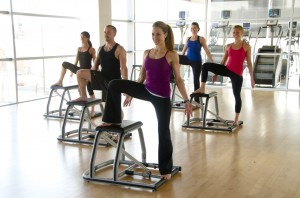Pilates is the best form of functional fitness available and can be done by anyone, from elite athletes to aging baby boomers. Pilates is a perfect stand-alone exercise system, and also complements many other forms of fitness and sports training. Pilates is a great tool for injury prevention, body awareness, balance, strength, flexibility and mental focus.
In order to run a Pilates program successfully, it’s important to have qualified, experienced instructors, a dedicated space (especially for equipment), quality equipment, strong program marketing and a dedicated Pilates coordinator, or manager, who understands the Pilates Method and the business side of running a successful program. Pilates programs should be treated like a separate business unit within your facility, and should be structured the same way you manage your personal training.
Ideally, a Pilates instructor should be educated in teaching private sessions, as well as small and large group classes in order to lead dynamic mat and equipment classes in any facility. A qualified Mat Pilates instructor should have a nationally recognized group exercise certification, along with a Pilates-specialty certification or training in either Mat Pilates or group Pilates equipment classes. Intro classes are a great opportunity for the instructor to build relationships with members and make them more comfortable about trying Pilates, which will entice them to come back for more. It’s also a great idea to hold equipment demonstrations and bring a Reformer out onto the main club floor so that it is visible to all members.
Per class, instructor pay rates for Pilates group Mat classes range from $20 to $40 and up. For equipment-based classes or sessions, it is usually based on a 40 to 60 percent split of the revenue between the instructor and facility. The more hours an instructor commits to train clients per week, the higher the split.
Often Pilates is recognized as a women’s-only form of exercise, and therefore does not appeal to all members. Consider offering programming that is targeted toward men, such as sports-specific training, to get them into the practice of Pilates. Another potential setback is that Pilates is viewed by some as an expensive form of exercise, or too challenging for the average person.
For additional information contact Brad Thorp, the VP of Sales and Marketing at bthorp@maddogg.com, 310.740.8826; or Kevin Bowen, the Director of Education at kbowen@peakpilates.com, 310.740.8814
There are many forms of Pilates a facility can offer and it is best to research a particular style and then promote its benefits. The five basic principles focus on breathing, pelvic placement, rib cage placement, scapular movement and head and cervical spine placement.
When searching for an instructor it’s important that they posses a nationally recognized Pilates certification. They should have good communication skills since Pilates involves a great deal of verbal cueing. A great instructor should have a dynamic personality that is able to sell themselves and the Pilates Method to potential clients. Often clubs will hire an instructor that has the certification and technical skills, but may not have the ability to attract, maintain or engage with clients, ultimately jeopardizing the business and business model.
We recommend that a facility or club identify personal trainers and group exercise instructors already on staff that have great communication and interpersonal skills and provide the means to train them in the Pilates Method.
Pilates is not a form of exercise that can be learned in one day or weekend. To have an effective program that keeps members engaged and continuously practicing Pilates, it is important that instructors complete a full course as well as obtain proper certification.
Without dedicated space, members and clients will take their business elsewhere and practice Pilates in a studio settings. As a fitness club, you have an advantage over storefront Pilates studios by offering other fitness programs, childcare, locker rooms etc. Share other elements of your club and use as key selling points.
A competitive price point to pay instructors is 45 to 60 percent of the sessions fees based on qualifications, years of experience and the number of hours dedicated to the facility. Something to consider is a tiered pay scale based on the number of hours a trainer spends training clients at a facility per week. The more hours spent training, the higher the percentage the instructor should be entitled to.
For additional information contact Sandy Gardner, the Vice President of Sales & Customer Service at sandy.gardner@merrithew.com, 1.800.910.0001 ext. 294; or Stefania Della Pia, the Program Director of Education and a Master Instructor Trainer at stefania.dellapia@merrithew.com, 1.800.910.0001 ext. 309
Stay ahead in the fitness industry with exclusive updates!
Rachel Zabonick-Chonko is the editor-in-chief of Club Solutions Magazine. She can be reached at rachel@peakemedia.com.













